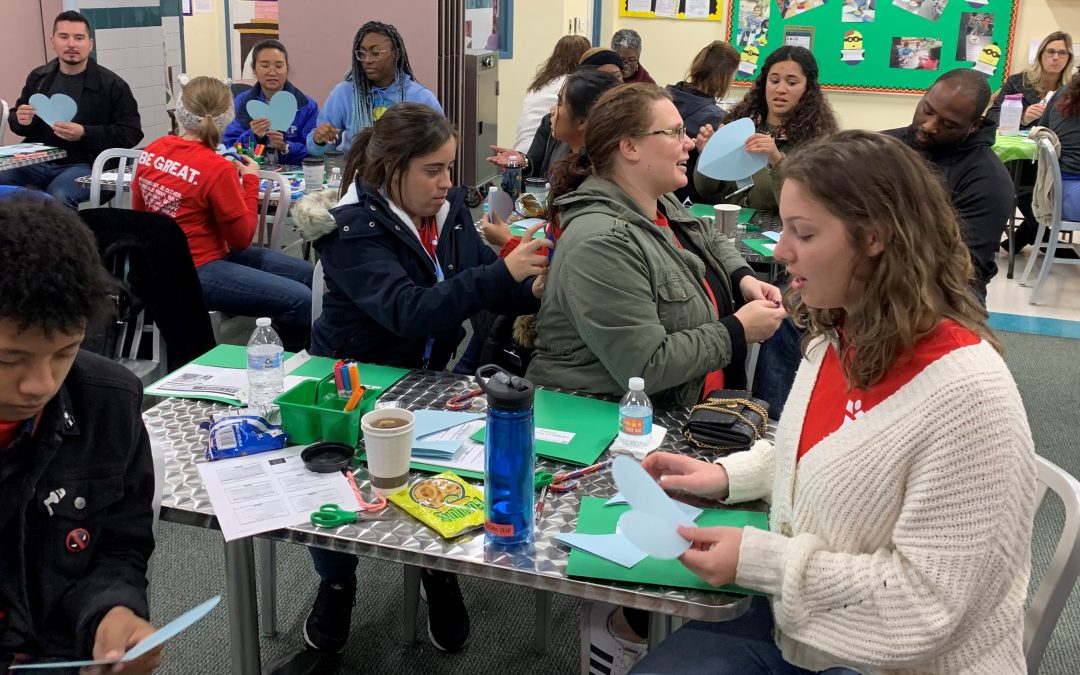
by pmdavis | Mar 6, 2020
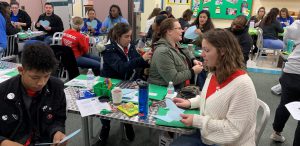
4-H Volunteer Training about healthy relationships!
Make 2020 the year you learn something new or share your talents with a young person in your community. 4-H, the nation’s largest youth development and empowerment organization, cultivates confident youth who tackle the issues that matter most in their communities. It allows youth to learn by doing. 4-H relies on screened, dedicated volunteers to promote its mission to help youth gain the knowledge and life skills they need to be productive, responsible citizens.
In the Florida Panhandle, we have 4-H programs in schools, afterschool settings, and on military bases where we provide curricula and training to enhance our youth experiences while being active in 4-H. We also have school enrichment programs offering youth 4-H experiences on a specific subject while in school. We have community clubs and special interest groups that are currently active and we need more caring compassionate adults to help! These opportunities are great for families to do together.
If you only have time for a short-term event and like sewing, grilling, cake decorating, gardening or love bugs and outdoor education, consider volunteering. Contact your local Extension Office to see what spring and summer workshops and day camps are being offered that need caring adults to act in the role of 4-H volunteers. Your time as a volunteer will provide our youth the safe place to pursue whatever interests, causes, and leadership roles are most important to them. It also allows you to learn from the youth about current trends, fashions and technology. It really is a two-way learning opportunity where all involved learn by doing.
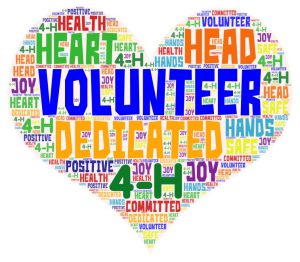
To volunteer, even for the summer workshops, you will need to be screened and trained, so contact us now. The screening and training process takes a little time. Please considervolunteering in your community. With over 70 different 4-H project areas from money and finances, gardening to computer science and rocketry, there are plenty of areas to work with youth to share your knowledge and skills. Please consider helping us live up to our motto of “making the best better” with 4-H by volunteering today. Simply contact your local extension office or check out our website for more information.
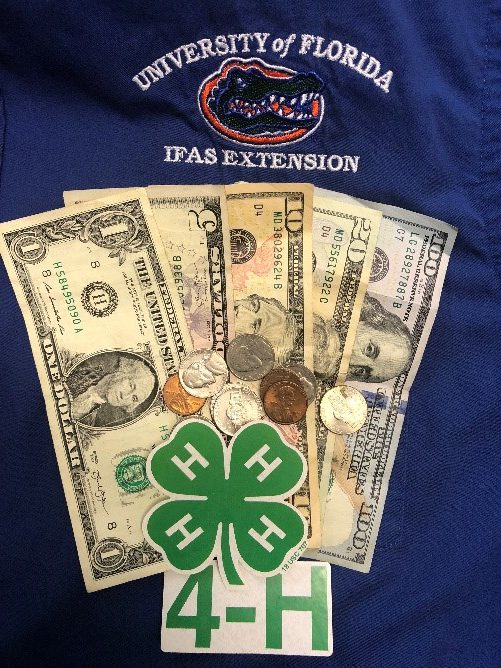
by pmdavis | Jan 10, 2020
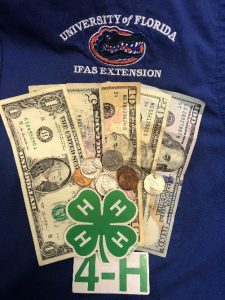
Are you financially savvy?
As a parent, I worry about children and their money habits! They often have trouble distinguishing between a need and a want. I often wonder if I am empowering them to be financially savvy. I know this is a topic that I continually work on for myself. It is important to start teaching healthy money habits early! It is also important for children to hear about personal finance to understand how money works in a variety of settings: home, school, and youth organizations. I know my children receive money as gifts and it tends to “burn a hole in their pocket” until it is gone. Like adults, children need to practice making “healthy financial” decisions so that those decisions become “healthy habits,” reducing stress in their lives.
With Valentine’s Day right around the corner, you might think of helping your children or grandchildren start a savings account to provide some financial security for the future. Then, encourage them to keep adding 10-20% of any money they receive to the account for a rainy day or that big purchase they desire.
RESOURCES AVAILABLE
Extension and 4-H have several publications and project books that provide guidance in the area of personal finance on spending, saving, investing, and donating. These projects can be done in a group setting or as a self-study project. National 4-H Curricula include “Financial Champions 1: Money FUNdamentals.” This piece has activities allowing kids to develop a money personality profile and style, understand the difference in needs and wants, make informed money decisions, set financial goals, and develop a money plan.
“Financial Champions 2: Money Moves” allows kids to learn how to predict outcomes and analyze their finances. They calculate interest; determine the cost of credit; learn how to manage a checking account, explore selecting financial services, make informed marketplace decisions and discover ways of handling money. National 4-H also has free curricula you can download for older youth.
UF/IFAS Extension also has free resources about money and financial management for adults and families on a wide range of topics such as Consumer Rights, Credit and DebtManagement, End of Life Issues, Finance and Family, Personal Finances Insurance, Retirement Planning, and Saving and Investing. University of Maryland 4-H also has a program called Financial Nuggets. This is a free download giving ideas on how to teach financial decision making to youth. It is designed for family involvement. Therefore families will increase their basic financial capacity and ability to make both short-and long-term decisions regarding spending and saving. It explores topics like needs verses wants, planning and managing money using a budget, how wealth is created and built, and managing risks.
Extension and 4-H want to encourage children, teens, and families to learn about personal finance, to practice what they learn and to teach others. We really want to get 4-H members and their families on the road to being money smart consumers. For more information on financial education and tools to help you become financially savvy or get out of debt, contact your local UF/IFAS County Extension Office, or visit http://florida4h.org. 4-H is one of the nation’s most diverse organizations and includes people from all economic, racial, social, political, and geographic categories. There are no barriers to participation by any young person. Participants are given the opportunity to engage in activities that hold their personal interest, while being guided by adult volunteers. If you are interested in volunteering, please contact your local office.

by pmdavis | Aug 9, 2019
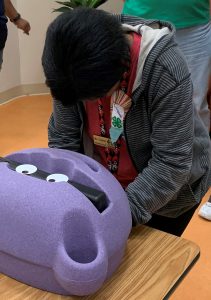
Looking for spots missed during hand washing by using black light and glow germ lotion that fluoresces under black light.
It’s hard to believe it is August already, with that we are getting ready to go back to school. Going back into the large group gathering requires a reminder to wash your hands often. You and your child will be around so many people and exposed to all kinds of germs. Regular hand washing helps you avoid getting sick and spreading your germs to others.
The CDC recommends that we wash our hands:
• Before, during, and after preparing food
• Before eating food
• Before and after caring for someone who is sick
• Before and after treating a cut or wound
• After using the toilet or after changing diapers or cleaning up a child who has used the toilet or been ill
• After blowing your nose, coughing, or sneezing,
• After touching an animal, animal/pet feed or treats, or animal waste
• After touching garbage
Take a moment to sit down and talk with your child about hand washing and the importance of washing their hands, especially when they get home from school.
Try this activity written by Tennessee 4-H to help youth see where they may be missing germs. This simple activity uses items you probably have in your kitchen. Begin by coating hands with a tablespoon of cooking oil. Next, sprinkle the oily hands with ground cinnamon. Have your child wash their hands using the steps outlined below. Once they have finished washing, have them smell their hands to see if they can still smell cinnamon. If they washed their hands correctly, the cinnamon smell and brown color should be gone from their hands.

A. Hands coated with cinnamon before hand washing
B. Quick wash like youth often do missing in between fingers, top of wrist, around nails
C. Thoroughly washed hands (all clean even between fingers)
Here are the steps we teach youth when they take our 4-H hand washing classes:
1. Wet your hands with clean, running water.
2. Apply soap and rub your hands together to make a lather. Make sure to get in between your fingers, under your nails, and on the top of your hands. Youth often miss these areas when we do a lesson on hand washing during 4-H events.
3. Scrub for at least 20 seconds—about the same amount of time needed to sing the Happy Birthday or ABC Song twice.
4. Finish by rinsing your hands with warm running water.
5. Dry hands with a clean towel or let air dry if a towel is not available.
6. Use the towel to turn off the water faucet to prevent re-contamination of your clean hands on a dirty faucet knob.
Have a fun and germ free day! 4-H is a family affair, offering many opportunities where both children and parents can participate in common interests. 4-H is one of the nation’s most diverse organizations and includes people from all economic, racial, social, political, and geographic categories. There are no barriers to participation by any young person. Participants are given the opportunity to engage in activities that hold their personal interest, while being guided by adult volunteers.
To find out more information about other 4-H programs like this or volunteer your time to work with youth, please contact your local UF IFAS County Extension Office.
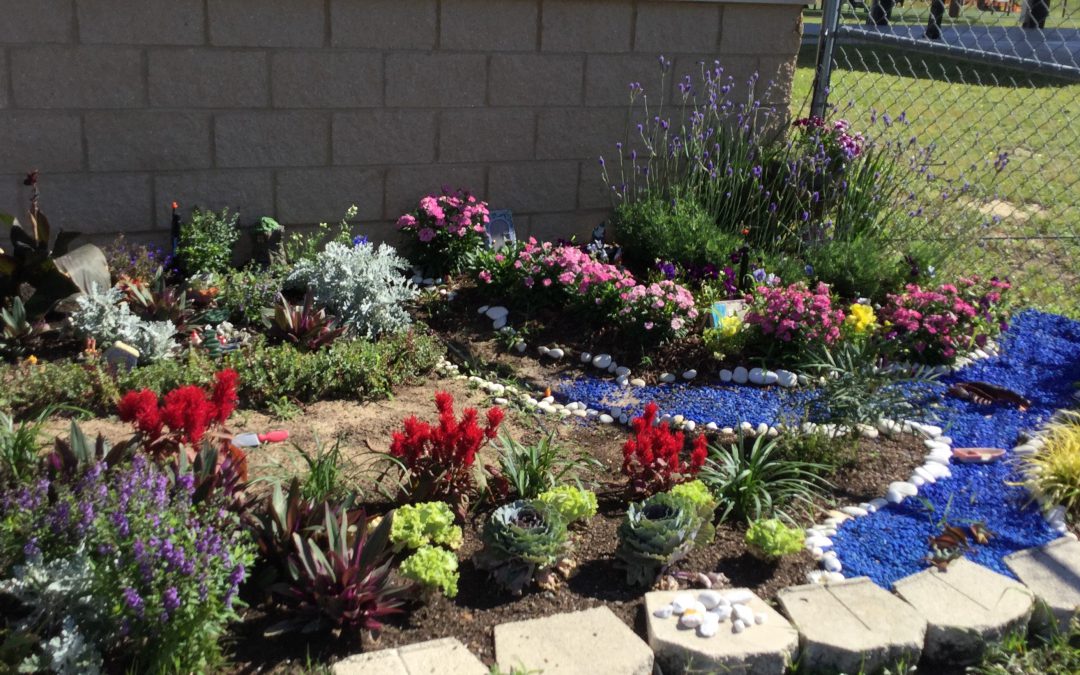
by pmdavis | Jul 5, 2019
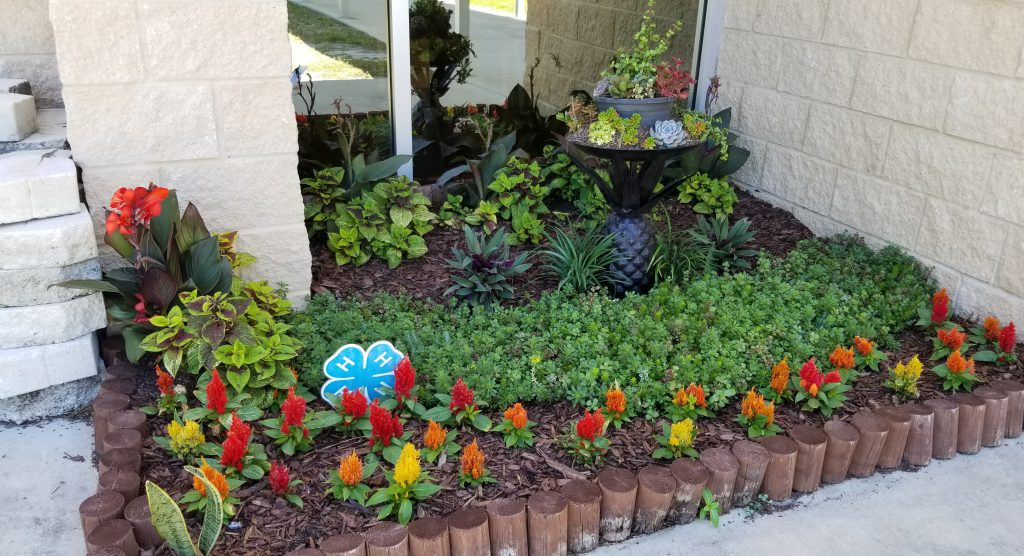
Succulent garden at entry of NSA-PC Youth Center
In September 2018, Ms. Bettina started the 4-H Garden Club at NSA-PC in Panama City, Florida. She had big plans for the garden and couldn’t wait to get started. These Navy youth, led by a caring adult staff member, started their 4-H journey. Then Hurricane Michael came, which devastated the area on October 10, 2018 and could have easily derailed all of their plans. Instead, the storm allowed youth to start with a clean slate and a renewed sense of vigor in rebuilding the garden at the NSA-PC Youth Center. The youth redesigned some of their beds using debris from the storm.
When the Youth Center reopened following the storm, most of the outdoor areas were off limits to the kids due to damage from the storm. That meant that the playground and other outdoor activities were not available. However, the 4-H Garden Club was allowed to function and allowed the youth itching to be outside and yearning for a way to cope with the devastating effects of Hurricane Michael to come together as a team and, along with Ms. Bettina, a garden to restore a sense of balance and ownership.
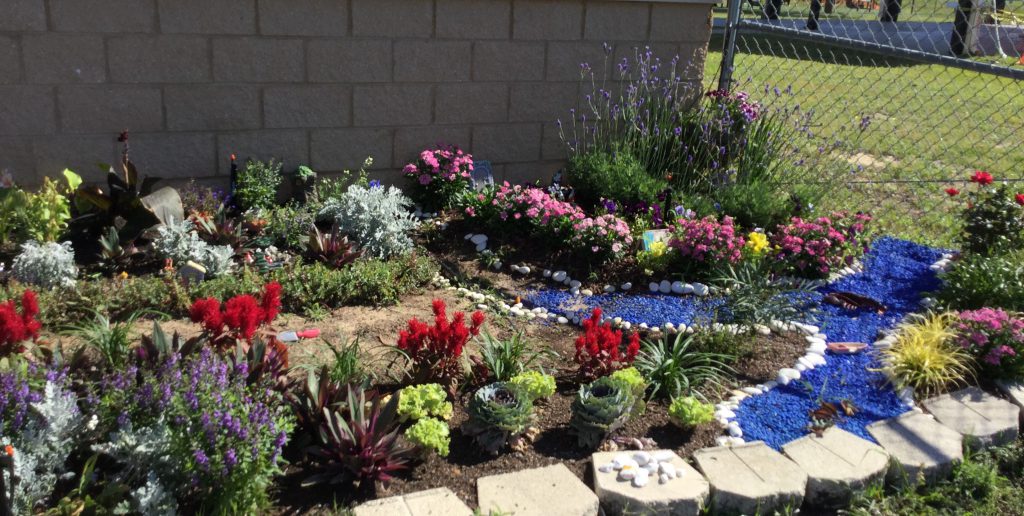
Whimsical garden bed designed by NSA-PC youth
The kids were eager to get started planning, implementing, and maintaining the new garden area. They created a plan for different types of gardens within their facility spaces. They researched which plants were best suited for the season and zone as well as which flowers would attract pollinators, because they hoped to see hummingbirds and butterflies. Ms. Bettina says that the kids came in every day asking if they were going to get to work in the garden. It created a healthy, active, and creative outlet for all involved. Soon the garden began to take shape with imaginative details and originality everywhere you looked.
All visitors to the Youth Center are welcomed by exquisitely maintained flower beds that surround the entrance to the building. The youth have created and maintained a beautiful area that enhances the building and greets visitors with beauty and color. These raised gardens are filled with hardy greenery as well as seasonal color and elevated containers that hold a cascade of many varieties of succulents.
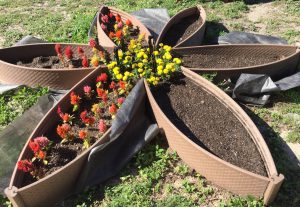
NSA-PC youth recycled old materials to create a new space to hold their flowers.
The 4-H Garden Club at NSA-PC is a perfect example of how sometimes a storm that seemingly derails plans actually presents an opportunity for growth, learning, and creating something more beautiful. Ms. Bettina’s 4-H Garden Club could not have come at a more perfect time. The gardening activities allow the youth to get outdoors while learning about different types of plants and how to care for them. Many students initially joined the Garden Club to get outside after the storm due to the playground closure. Youth participating in the 4-H Garden Club at NSA-PC have learned about more than just the science of plants; they are learning to work as a team with improved communication skills in order to continue maintaining their garden as well as environmental awareness and recycling by taking used items to make new treasures for their flower beds.
4-H is one of the nation’s most diverse organizations and includes people from all economic, racial, social, political, and geographic categories. There are no barriers to participation by any young person. Participants are given the opportunity to engage in activities that hold their personal interests while being guided by adult volunteers. If you would like to learn more about 4-H programming in your local area, or how to get involved as a 4-H volunteer, please contact your local UF IFAS County Extension Office, or visit http://florida4h.org.
RESOURCES
For more tips and ideas to help build your personal garden, visit http://edis.ifas.ufl.edu/ as there are many documents available to help build your personal gardens.
This article was written by Jennifer Sims and Paula Davis.
by pmdavis | Apr 10, 2019
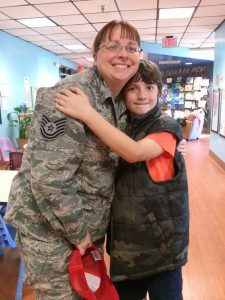
Purple Up! on Friday, April 12th
Most people think of the color green when they think of 4-H, but on Friday April 12, 2019, 4-H youth and volunteers in Florida will Purple Up! to show support for our military kids and families. Join us in showing support and celebrate our young heroes! Participation in the 10th annual Purple Up! day is easy – wearing purple and take photos to share on social media using #fl4h and #purpleup.
Why Purple Up?
Military youth have unique challenges. Imagine how you would feel about having long and repeated separations from your parent. Imagine your mom or dad missing important events like birthdays, holidays, and school events. How would you feel about frequent relocation or moves, having to make new friends, get familiar with new schools, and find new 4-H clubs and teams to join? These are all common experiences for military youth!
Many military children take these changes in stride, but it’s also hard to rebuilding a world every time they move. UF/IFAS Extension and 4-H are proud to be a part of the military family – 4-H works with military youth centers across the nation and overseas to create some consistency for youth in these situations.
Why the Color Purple?
Purple symbolizes all branches of the military and is the combination of Army green, Coast Guard blue, Air Force blue, Marine red and Navy blue. By wearing purple and sharing in a visible way, you can show support and thank military children for their strength and sacrifices.
Did You Know?
Florida has the fifth highest number of school-age military children in the country according to the Department of Defense Manpower Data Center. We also have over 50,000 active and reserve military members whose families worry that they are in harm’s way when they deploy.
Be creative….the goal is for military youth to see the support in their school, youth groups, and the community! If you don’t have or own a purple shirt, wear a purple ribbon, tie or headband. Just show your support and let our youth know we care about them! Can’t make the Purple Up! date? Then do something another day in April, the Month of the Military Child!
Remember, take pictures of your group wearing purple and share them on social media using #fl4h and #purpleup.
This allows us to:
- collectively honor military children and their families
- let military kids see the support of their community
- thank military kids for their commitment and sacrifice
For more information on Purple Up!, contact Dr. Paula M. Davis at UF/IFAS Extension Bay County at 850-784-6105.
For more information on 4-H in your county, follow us on Facebook, and contact your local UF/IFAS Extension office.
By Paula Davis, Janet Psikogios and Jennifer Simms












